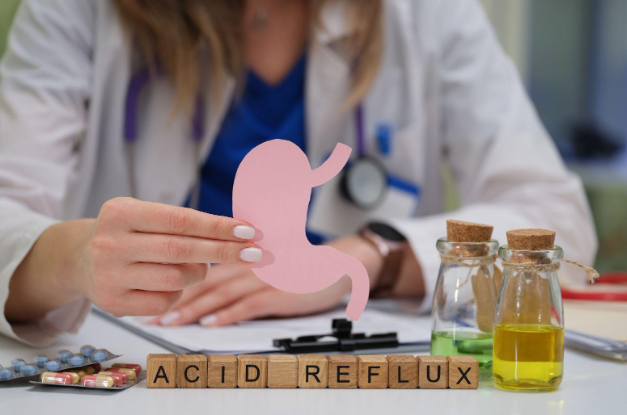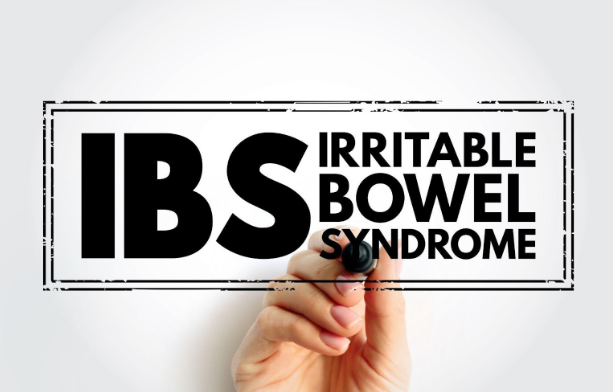Heartburn or Something More? A Guide to Acid Reflux

You may have heard the terms heartburn and acid reflux tossed around during major sports events, such as the Super Bowl. While they are often used interchangeably, heartburn and acid reflux are not the same. Additionally, it is also worth knowing what GERD is. Keep reading to resolve any doubts once and for all!
Acid Reflux vs Heartburn
Acid reflux is a frequent medical issue that varies in intensity from mild to severe. Gastroesophageal reflux disease (GERD) is a chronic and more serious manifestation of acid reflux. Heartburn is a symptom that can occur with both acid reflux and GERD.
Defining Heartburn
Heartburn is often described as a burning sensation or discomfort in the chest, typically behind the breastbone. It can feel like a fiery or hot sensation that rises up from the stomach towards the throat.
Some people also experience a sour or acidic taste in the mouth. This discomfort can vary in intensity, from mild to severe, and may worsen when lying down or bending over.
Overall, heartburn can be quite uncomfortable and may persist for several hours after eating or when the stomach is empty.
Demystifying Acid Reflux
To put it simply, acid reflux occurs when stomach acid flows back up into the esophagus, the tube that connects the throat to the stomach. Normally, a ring of muscle called the lower esophageal sphincter acts as a valve, preventing stomach acid from making its way upward. When this valve weakens or relaxes abnormally, acid can escape and irritate the lining of the esophagus, leading to the uncomfortable sensation known as acid reflux.
As already mentioned, heartburn is the hallmark symptom of acid reflux. Other common symptoms include regurgitation of acidic fluid into the mouth, a sour taste, difficulty swallowing, and a persistent cough.
While occasional heartburn is normal and usually harmless, frequent or severe episodes may indicate underlying issues such as gastroesophageal reflux disease (GERD), a chronic and serious form of acid reflux.
Defining GERD
GERD is a chronic condition characterized by the persistent reflux of stomach acid into the esophagus. Unlike occasional acid reflux, which is common and usually harmless, GERD is characterized by frequent and severe episodes of heartburn and regurgitation that can significantly impact a person's quality of life.
Untreated GERD can lead to complications that affect both the esophagus and overall health. Over time, repeated exposure to stomach acid can cause inflammation and irritation of the esophageal lining, leading to a condition known as esophagitis.
In severe cases, this inflammation can progress to more serious complications, such as esophageal strictures (narrowing of the esophagus), Barrett's esophagus (a precancerous condition), and even esophageal cancer.
GERD-related symptoms can significantly impair sleep quality, disrupt daily activities, and contribute to diminished overall well-being.
Effective Strategies for Management and Relief of Acid Reflux
Making lifestyle changes is often the first line of defense for managing acid reflux.
- Dietary Adjustments: Identify and avoid trigger foods that exacerbate acid reflux symptoms, such as spicy foods, citrus fruits, tomatoes, caffeine, and fatty or fried foods. Focus on consuming smaller, more frequent meals and incorporating reflux-friendly foods like lean proteins, whole grains, fruits, and vegetables into your diet.
- Weight Management: Excess weight can contribute to the development and worsening of acid reflux symptoms. By achieving and maintaining a healthy weight through regular exercise and a balanced diet, individuals can reduce the pressure on the stomach and lower esophageal sphincter, thus minimizing the risk of reflux.
- Meal Timing: Avoid eating large meals or heavy snacks close to bedtime, as lying down shortly after eating can increase the likelihood of acid reflux. Aim to finish meals at least two to three hours before lying down or going to sleep to allow for proper digestion and minimize reflux episodes.
- Elevate Your Head: Elevating the head of your bed by six to eight inches can help prevent acid reflux during sleep by using gravity to keep stomach acid from flowing back up into the esophagus. Another option is that you can use a wedge-shaped pillow to elevate your upper body while sleeping.
See also:
Managing GERD during the Holidays
Medications and Remedies
In addition to lifestyle modifications, several over-the-counter and prescription medications can provide relief from acid reflux symptoms.
Antacids neutralize stomach acid and provide temporary relief from heartburn and indigestion. They are available in various forms, including tablets, liquids, and chewable tablets, and can be taken as needed.
H2 receptor antagonists (e.g., ranitidine, famotidine) reduce the production of stomach acid, thereby alleviating symptoms of acid reflux. These medications are typically taken before meals or at bedtime and provide longer-lasting relief compared to antacids.
PPIs (e.g., omeprazole, esomeprazole) are powerful acid-suppressing medications that block the production of stomach acid. They are often prescribed for individuals with frequent or severe acid reflux symptoms and may require a prescription from a healthcare provider.
Some individuals find relief from acid reflux symptoms through natural remedies such as ginger tea, chamomile tea, apple cider vinegar, or licorice root. Keep in mind to always consult with a healthcare professional before trying any new remedies. This is especially important if you have a medical history of underlying health conditions or are taking medications.
Seeking Professional Guidance
If lifestyle modifications and over-the-counter remedies fail to provide adequate relief, or if you experience persistent or severe acid reflux symptoms, you should seek guidance from a healthcare professional. A gastroenterologist or primary care physician can perform a comprehensive evaluation.
Let’s take a look at the more common diagnostic tests for GERD:
Upper Endoscopy (Esophagogastroduodenoscopy, or EGD)
During an upper endoscopy, a flexible tube equipped with a camera (endoscope) is inserted through the mouth and into the esophagus, stomach, and upper part of the small intestine. This allows healthcare providers to visualize the esophageal lining and identify signs of inflammation, irritation, or complications such as esophagitis, Barrett's esophagus, or strictures.
Esophageal pH Monitoring
Esophageal pH monitoring measures the acidity levels in the esophagus over a period of time, typically 24 to 48 hours. This test can help determine the frequency and duration of acid reflux episodes and assess the effectiveness of acid-suppressing medications.
Esophageal Manometry
Esophageal manometry evaluates the function and coordination of the muscles in the esophagus. This test measures the pressure exerted by the muscles as they contract and relax, providing insights into the integrity of the lower esophageal sphincter.
Barium Swallow
A barium swallow involves swallowing a chalky liquid containing barium, followed by X-ray imaging of the esophagus and stomach. This test can detect abnormalities such as a hiatal hernia or strictures.
A Guide to Treatment Options for GERD
In cases where lifestyle modifications and medications fail to provide adequate relief, surgical intervention may be considered. Fundoplication is a surgical procedure in which the upper part of the stomach is wrapped around the lower esophageal sphincter to strengthen it and prevent reflux. This procedure can be performed laparoscopically and is generally effective in reducing GERD symptoms.
Another option is implanting a LINX device around the lower esophageal sphincter. This is a ring of small and very flexible magnetic beads where the magnetic attraction between the beads helps keep the lower esophageal sphincter closed to prevent reflux while allowing food to pass through normally. This minimally invasive procedure offers an alternative to traditional fundoplication surgery and can provide long-term relief for GERD symptoms.
Red Flags for Emergency Medical Treatment
While most GERD symptoms can be managed on an outpatient basis, certain signs may indicate a medical emergency requiring immediate attention. These include:
- Severe Chest Pain: Chest pain that is sudden, severe, persistent, or radiates to the arms, neck, jaw, or back may indicate a heart attack rather than GERD. If you experience chest pain accompanied by shortness of breath, sweating, dizziness, or nausea, seek emergency medical care immediately.
- Difficulty Breathing: Difficulty breathing or shortness of breath can be a sign of aspiration, where stomach contents enter the airways and cause respiratory distress. This requires urgent medical attention to prevent complications such as pneumonia.
- Unintended Weight Loss: Unexplained weight loss can be a red flag for underlying gastrointestinal disorders, including esophageal cancer. If you experience significant or unintentional weight loss along with GERD symptoms, consult a healthcare professional promptly.
- Persistent or Worsening Symptoms: If GERD symptoms persist despite medication and lifestyle modifications, or if they worsen over time, it may indicate complications such as esophagitis, Barrett's esophagus, or strictures. Prompt evaluation by a healthcare provider is necessary to prevent further complications.
- Difficulty Swallowing Solid Foods: Difficulty swallowing solid foods, particularly if it's progressively worsening, may indicate esophageal narrowing (stricture) or a more serious condition such as esophageal cancer. Seek medical evaluation promptly to determine the underlying cause.
Additionally, if you experience any of the following symptoms, seek emergency medical care immediately:
- Sudden, severe chest pain
- Difficulty breathing or shortness of breath
- Profuse sweating, dizziness, or lightheadedness
- Vomiting blood or black, tarry stools
- Severe abdominal pain or bloating
- Difficulty swallowing accompanied by drooling or inability to manage secretions
At Northlake Gastroenterology, we can help you with GERD diagnosis and
management.
Request an appointment with us today!
More Blogs












